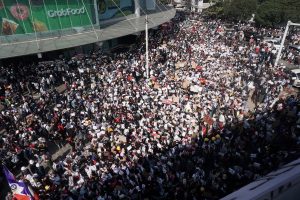Myanmar’s military government is taking steps to strangle media coverage of the country’s ongoing political crisis, announcing the cancellation of licenses for five independent media organizations.
The five outlets — Mizzima, the Democratic Voice of Burma (DBV), Khit Thit Media, Myanmar Now, and 7Day News — had been offering extensive coverage of the protests that have emerged since the February 1 coup, including by livestreaming video online.
In announcing the revocations, the state broadcaster MRTV stated that the media companies “are no longer allowed to broadcast or write or give information by using any kind of media platform or using any media technology.”
Shortly before the announcement was made, the offices of Myanmar Now were raided by the authorities, the publication said yesterday. Soldiers destroyed the locked doors of the office, which was evacuated a few days before the military coup, and later emerged carrying office equipment. The raid came a day after Myanmar Now published a blistering editorial describing the Myanmar military as a “terrorist organization” that “seems sadistically intent on breaking the nation’s spirit.”
The five banned outlets have been central to the revival of the press Myanmar’s antique system of pre-publication censorship was abolished in 2012, part of the broad political reforms engineered by the military and its political proxies.
The media controls are the junta’s attempt to control the flows of information and attention upon which the protest movement depends heavily. The junta has detained at least 34 journalists since the coup, including a Myanmar Now reporter and a photographer for the Associated Press. Many have been charged under a public order law that carried a penalty of up to three years imprisonment.
The revocation of press licenses is also an attempt to stop reporting of the increasingly ugly methods that the military and its auxiliaries are using to quash the protests that show no sign of abating, five weeks after the military seized power and abrogated the National League for Democracy (NLD)’s massive victory at November’s national election.
Over the weekend, security forces descended on universities, hospital compounds, and Buddhist pagodas, where they apparently established makeshift operations centers. In Mandalay, military trucks stormed universities, including Mandalay Technological University, where troops rained in tear gas and rubber bullets before occupying the campus. According to the Global New Light of Myanmar, the bland and stenographic state media outlet, described the “havoc” unleashed by the protests and said the military was taking control of public universities “for the benefit of the people.”
On Monday, the military crackdown resulted in at least three deaths by shooting, including two in the northern town of Myitkyina and one in the Irrawaddy Delta region west of Yangon.
The weekend also brought disquieting reports that an NLD official in Yangon was tortured and killed while in police custody. According to the rights group Human Rights Watch (HRW), Khin Maung Latt, a ward chairman in Pabedan township in Yangon, was taken from his home by police on March 6. The next morning, Khin Maung Latt’s family recovered his body from a hospital after receiving a notification from the authorities. The body had severe wounds to the hands and back and was covered in a bloody sheet, a witness told HRW.
Given the tactics now being used, it is not surprising why the junta is seeking to choke off the flow of information that has helped magnetize international attention keep the Myanmar protests on the global agenda.
In her 2017 book “Twitter and Tear Gas,” Zeynep Tufekci wrote that such connections were vital to digitally networked social movements. “Attention is oxygen for movements. Without it, they cannot catch fire,” she argued. “Powerful actors try to smother movements by denying them attention.” In the age of the networked public sphere, censorship is best defined not as the blocking of sensitive information as much as “as a broad term for denial of attention through multiple means.”
This is no straightforward feat in a fragmented information environment, in which traditional media gatekeepers have been defenestrated and anyone with a phone and an internet connection is a potential reporter.
DVB Executive Director Aye Chan Naing told the Associated Press that despite having its license revoked, the outlet would continue broadcasting on satellite TV and online. “We worry for the safety of our reporters and our staff, but in the current uprising, the whole country has become the citizens’ journalists and there is no way for military authorities to shut the information flow,” he said.
But the importance of attention to the Myanmar protests make it likely that the authorities will resort to more far-reaching methods, including internet blackouts and mass censorship, to deny the movement of the breathable air it needs to flourish. Moreover, a context in which everyone is a potential journalist is also one in which everyone is a potential target.

































